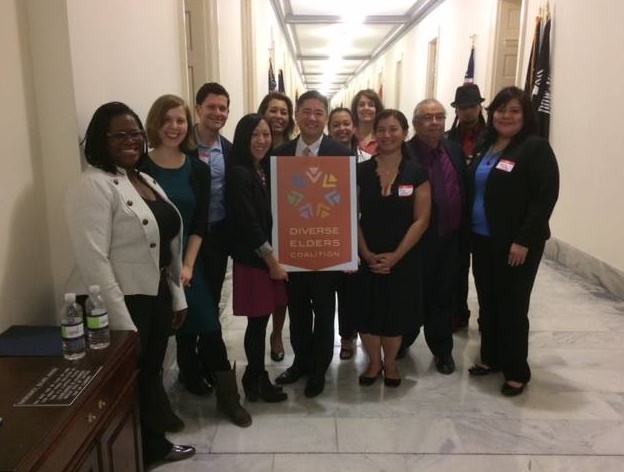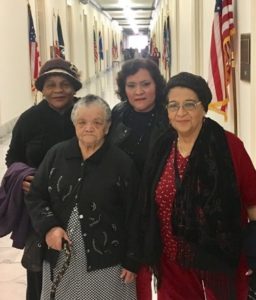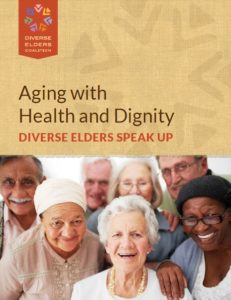The future of the United States is diverse. By 2050, nearly one in five Americans will be an immigrant, and the non-Hispanic white population will increase more slowly than other racial and ethnic groups.
The future of the United States is also one of an aging population. In that same time frame, the number of adults 65+ will double to 84 million. By 2056, the number of older adults in this country will actually be greater than the number of people 18 and younger.

Photo by Kevin Simowitz
The changing face of our nation is one of the reasons why the Diverse Elders Coalition was formed, and the stories of diverse older adults is what brought us to Washington, DC last Thursday for the release of our new report, “Aging with Health and Dignity: Diverse Elders Speak Up.” In 2016, we asked our communities to share their comments about what is most needed for them to age with health and dignity. Nearly 5,000 people responded in six different languages, representing all fifty states, and despite differences in race, gender, sexual orientation, location, and age, there were some common threads in the comments that diverse older adults submitted to us:
- Diverse elders need culturally and linguistically competent services. Our communities have a greater need for supportive programs and services as we age, but we are less likely to access those programs. Why? If we can’t understand or be understood by automated telephone menus, or if forms and important documents aren’t available in our native languages, we can’t fully participate in services. If we are afraid of discrimination or harassment from staff and peers, we won’t feel safe in facilities where programs and services are offered. If our cultures and traditions are not taken into account when programming is designed, we may feel more isolated and misunderstood than when we walked through the door.
- Diverse elders need safe, affordable housing. Many of the older adults who submitted comments to us described rising costs of living and changing neighborhoods that have left them vulnerable. Diverse elders are being pushed to the margins, either because of rising real estate pricing, lack of public transportation, and/or because of practices that have systematically denied wealth to our communities. We need more support that allows us to stay in our homes as we age, and we need eldercare facilities that allow us to bring our whole selves into the room.
- Diverse elders need disaggregated data collection about our communities. If you don’t know whom you’re serving, you can’t serve us well. When our populations are lumped into aggregated categories, like “Hispanic” or “Asian” — or when data isn’t collected at all, as is often the case with sexual orientation and gender identity — very real health and social disparities are missed. The health of Mexican Americans looks different from the health of Puerto Rican Americans; poverty levels and English proficiency varies dramatically among Asian American and Pacific Islander communities. Ignoring these variations among our communities leads to one-size-fits-all policies that truly do not fit.
These recommendations and more can be found in our new report, which you can read, download, and share here. We urge policymakers and advocates to use these findings when creating aging policies and programming that will serve older adults in this country.

Photo by Nicolás Peña
In this political moment — particularly as Congress explores budget cuts and the elimination of programs like the Affordable Care Act that support our communities’ ability to age with health and dignity — we must ensure that the voices of those who are most impacted are the loudest in the room; the growing numbers of diverse older adults cannot be ignored.
Thank you to everyone who joined us on Capitol Hill for last week’s briefing. If you weren’t able to be there in person, or if you want to revisit any of the powerful remarks that were made by our speakers, you can check out the video here. You can also view photos from the event on our Facebook page or read the transcript on Storify.
What’s next? We’re meeting with legislators, advocacy groups, and allies to see how we can work in partnership to improve health equity for diverse elders. If you want to partner with us, or if you have a story to share, please reach out! We’d love to hear from you.
The opinions expressed in this article are those of the author and do not necessarily reflect those of the Diverse Elders Coalition.


